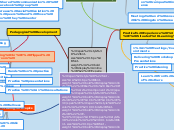Experiential Learning, a Peer Program Model
(understanding theory and practice)
Sense of Community
Working towards similar goals
Volunteerism
Shared communication (facebook group)
Decrease social isolation of peers and those who they mentor
Peer to Peer Program core components
- Develop academic learning strategies and writing skills
- Make the transition from high school to university
- Overcome academic challenges, including recognizing/responding/referring students who identify mental health as a contributing factor to their academic challenge
- Develop peer leadership skills
- Support the development of personal skills
-improve retention rates, and grade point average
1:1 Meetings/Coaching/Appointments
Practical Experience
(Situated Learning)
Delivering Workshops / Presentations
Teach students how to set effective goals
Offer advice, encouragement and support
Training
(Flipped Classroom)
Grammar lessons
Homework ( reading & research)
Group activities
Discuss theory and case studies
Pedagogical Development
Hands on practice
Practice presentations
Practice 1:1 consultations
Team Building
Training Topics
Mental Health / Wellness
Communication Skills
EDI ( equity, diversity, inclusion)
Self Care
Indigenous sensitivity training
Outreach
Workshops and meeting on campus including residence
working with athletics (coaches and student athletes
Working with specific faculty / groups
